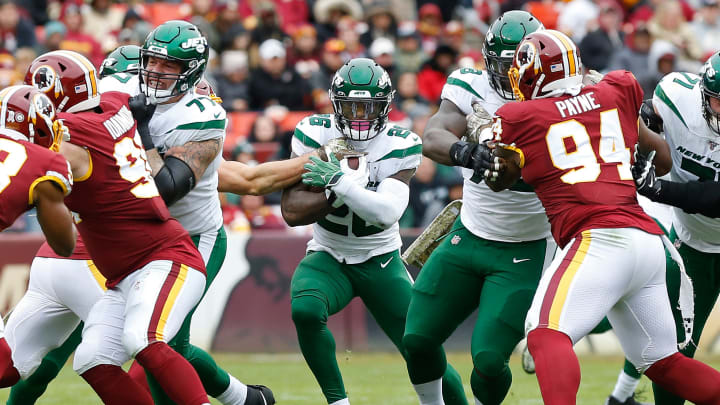Greg Buttle on Jets running back situation: 'You Can’t Say Le’Veon Bell is a Bust'

On Sunday, a New York Jet not named Le’Veon Bell had the highest rushing total of the season for any of the team’s running backs this season. That Bilal Powell had 74 rushing yards in a 22-21 win over the Miami Dolphins called into question why the Jets paid such big money for Le’Veon Bell this offseason.
For former Jets star Greg Buttle, Bell as a player is an asset to the team. Spending the type of dollars that they invested at that position, however, has Buttle questioning the offseason decision making of former general manager Mike Maccagnan.
This offseason, Bell was the prize catch of the Jets free agency, signing a four-year, $52.5 million contract that included $27 million in guaranteed money. He has been hammered as a bust free agent signing for the Jets because the numbers on the contract are high and his production hasn’t been.
So far on 183 rushing attempts, Bell has 589 rushing yards and three rushing touchdowns. He’s added another 403 receiving yards and one receiving touchdown. The projection of 765 rushing yards would be the lowest of Bell’s career in any season where he has played a minimum of 12 games.
That the Jets had their best individual rushing performance of the season with Bell out on Sunday due to illness only adds fuel to the fire that the Jets misfired this offseason in signing Bell.
Buttle played for the Jets from 1976 to 1984 and was influential part of the defense. Now he works as an analyst for Jets games on ESPN New York Radio. He said that there is nothing wrong with Bell or his performance this year, but he questions investing as much as they did in a running back this offseason.
It is a thoughtful and pragmatic outlook on Bell, who Buttle thinks has done a good job with the Jets this year despite some difficult circumstances.
“There’s always naysayers of anything. But what do you mean he’s a bad signing? First of all, Le’Veon Bell is a wonderful football player. He can run, he can catch, he can block. You want to go there and say ‘OK, he’s a bad signing.’ But what reason? I am – and I’ve had said this many times, whether on the air or over the past 30 years when I was playing – that running the ball is overrated in the game of football,” Buttle told SportsIllustrated.com.
“And I can see fans who listen to every single prognosticator, every single media guy, former players say ‘What we have to do in the game today, we have to stop the run. You have to run the ball.’ And every facet of football, when you talk about winning, doesn’t include running the ball. You got to throw the ball to win in this league and particularly after 1970. If you want to tell me that they shouldn’t have gone out and paid for Le’Veon Bell because running the ball is secondary in this league, I’m with them. But you can’t say Le’Veon Bell is a bust because of yards per carry…there’s too much that goes on in a football game. Too many pieces going on for anyone to say ‘Le’Veon Bell is a bust.’ I think he’s played pretty well as a matter of fact.”
The signing of Bell was greeted by fans and the media as a sign this past offseason that the Jets were ambitious in taking the next step in their rebuild. But a 5-8 record and a limited impact statistically has led to the narrative that Bell isn’t contributing to the expectation level that his contract would suggest.
Part of the issue with Bell is out of his control. The offensive line has been poor and starting quarterback Sam Darnold missed three games early in the year, casting the entire offense in a different light and hurting his production.
“I must be totally honest that a running back today is a first round draft pick, I just don’t get it. Unless you’re a football team that is on the verge of [the] Super Bowl,” Buttle said.
“And you know what, you look around your roster and say ‘I have offensive tackles, I have wide receivers, I have a quarterback…I’ll take a shot and get a running back’. Then I’d say ‘OK’ but to say in the offseason that I need to get the best running back in the market to be my guy.”
